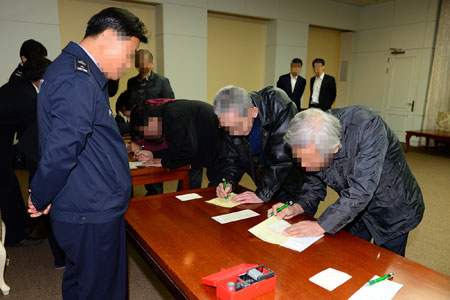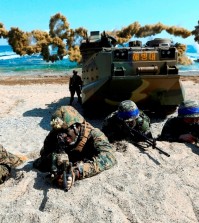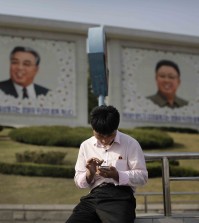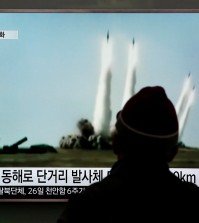- California Assembly OKs highest minimum wage in nation
- S. Korea unveils first graphic cigarette warnings
- US joins with South Korea, Japan in bid to deter North Korea
- LPGA golfer Chun In-gee finally back in action
- S. Korea won’t be top seed in final World Cup qualification round
- US men’s soccer misses 2nd straight Olympics
- US back on track in qualifying with 4-0 win over Guatemala
- High-intensity workout injuries spawn cottage industry
- CDC expands range of Zika mosquitoes into parts of Northeast
- Who knew? ‘The Walking Dead’ is helping families connect
N. Korea Returns 6 “Defectors” to S. Korea

South Korean “defectors” handed over by North Korea, Friday, go through entry procedures at the truce border village of Panmunjeom in Paju, Gyeonggi Province. (Courtesy of Ministry of Unification)
By Chung Min-uck
North Korea handed over six South Korean “defectors” at the truce village of Panmunjom on Friday.
The six men crossed over into the South’s side of the village at around 4:50 p.m. KST, according to the Ministry of Unification, and they will be questioned about the motives behind their “defection” to the Stalinist country.
The body of a South Korean woman, the wife of one of the defectors was also returned, the ministry said. “The North said she was killed by her husband during a family fight but this has to be verified,” said an official.
No media was allowed to witness the arrival of the South Koreans, with authorities saying they will be given a medical checkup and taken to an undisclosed secure location for questioning.
Pyongyang’s Korean Central News Agency reported the news and said the decision was made from a “humanitarian perspective” because the defectors “openly admitted and repented their crimes.”
“The government verified overnight that all six are South Korean citizens, but because the North claimed they voluntarily crossed over into the North, it has been determined that their names will not be released until they have been questioned,” said Kim Eui-do, the ministry spokesman, in a briefing.
Releasing names of the people could raise legal issues because they may face criminal charges under the National Security Law if they willingly entered the North without getting prior approval from the government.
Regarding criticism over Seoul’s inability to verify the defectors’ identities, Kim said it is impossible to know these unless the North reveals them. “The government just does not keep data on people who may have entered the North without permission,” he explained.
Related to the return, another government source said that none seem to be “notable figures” and that it is highly likely that they entered the country over the Chinese-North Korean border.
Regardless of whether the six went to the North voluntarily, the unification ministry said it welcomed the North’s decision to send them back referring to the move as a “humanitarian” gesture. Experts say the rare move by the North is viewed as a way to mend fences with the South.
“The North is seeking to engage in dialogue through various reconciliatory gestures,” said Kim Yong-hyun, a professor of North Korea studies at Dongguk University in Seoul. The North also gave approval Thursday for South Korean lawmakers to enter the joint Gaeseong Industrial Complex.
















